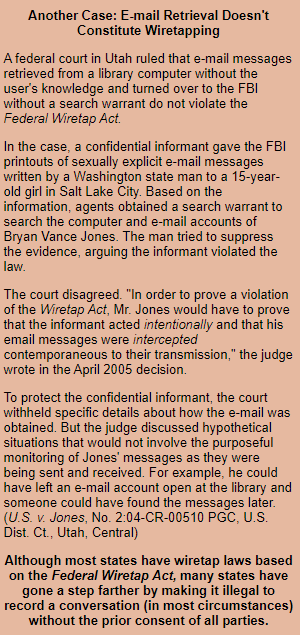Does Spyware Evidence Hold Up in Court?

We all know that spyware programs can surreptitiously monitor the activities of computer users, but not everyone is aware that using spyware may be a violation of your state's anti-wiretapping laws. If you collect information this way and hope to use it to prove a case in court, you may find yourself without admissible evidence.

In one divorce case, a Florida Appeals Court barred a wife from introducing certain items of evidence because the information was ruled to have been gathered illegally. To collect the data, Beverly O'Brien installed spyware on her husband's computer that took snapshots of all chat conversations, e-mails and instant messages he sent and received. The program had been installed to collect communications between the husband and another woman.
Once the software intercepted messages, it sent the information to a holding place, where it was stored until Mrs. O'Brien accessed it. The purpose was to provide the court with evidence of her husband's extra-marital relationship.
After messages were retrieved, the husband discovered the spyware and uninstalled it. He then filed a motion with the court to enjoin his wife from disclosing the contents of the messages because they were obtained illegally. The trial judge agreed with him and barred Mrs. O'Brien from using the electronic communications as evidence in the divorce case based on the fact that such methods violate Florida's wiretapping laws.
The wife appealed, arguing that the law didn't cover electronic communications that were retrieved from storage because they were not "intercepted communications." But the appeals court found that "there is a rather fine distinction between what is transmitted as an electronic communication subject to interception and the storage of what has been previously communicated." Because the messages were captured as they were sent in real-time, Florida's wiretapping laws applied.
In deciding the case, the appeals court relied on previous federal court wiretapping decisions for guidance, since no Florida court had opined on the issue. It affirmed the trial judge's ruling that the messages were subject to the wiretapping statute, and therefore not admissible as evidence. (Beverly Ann O'Brien v. James Kevin O'Brien, No. 5D03-3484, 5th District Court of Appeals, Florida, 2/11/2005)
Important distinction: The spyware used by the wife allowed the messages to be intercepted instantaneously so the court ruled they violated wiretapping laws. However, other courts have ruled that the e-mail messages of employees that companies access from electronic storage facilities do not violate wiretapping laws and can be used as evidence in litigation.
As electronic evidence becomes more prevalent, cases such as this one provide guidance to other courts. Although O'Brien v. O'Brien was a civil case that emanated from a divorce, it illustrates some of the issues involved in whether information gathered by unauthorized spyware programs is admissible as evidence. Florida's wiretapping laws are closely modeled after the Federal Wiretap Act, as are the laws of many states and U.S. territories.
